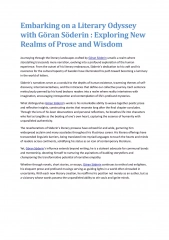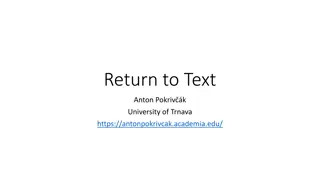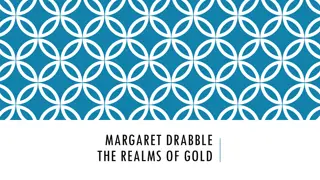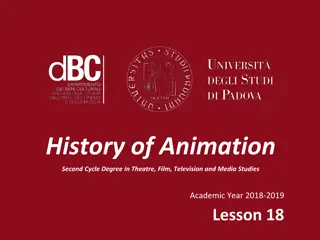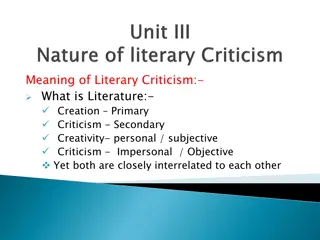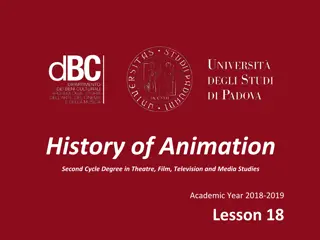Exploring the Literary Legacy of Karel Čapek
Delve into the life and works of Karel Čapek, a prominent Czech writer known for his thought-provoking themes and innovative storytelling. From his exploration of human nature to his analysis of societal issues, this overview provides insight into the enduring relevance of Čapek's writing and the impact of historical events on his literary perspective.
Download Presentation

Please find below an Image/Link to download the presentation.
The content on the website is provided AS IS for your information and personal use only. It may not be sold, licensed, or shared on other websites without obtaining consent from the author. Download presentation by click this link. If you encounter any issues during the download, it is possible that the publisher has removed the file from their server.
E N D
Presentation Transcript
CRITICISM: apek didn t really understand the nature of evil was unoriginal, pedantic was an optimist, was outof touchwith reality instinctivelywas an anti-Semite was anti-intellectual
IS APEKS WRITING STILL TOPICAL? His formative years: Austro-Hungarian Empire Traumaticexperienceof First World War Analysis of political relations under imperialism: - topical again today
DID APEK BELIEVE IN PROGRESS? Was apek thevictim of struthious escapism ? Did he believe that futurewill always be better? FOR APEK, CIVILISATION IS ALWAYSON THE BRINK OF DESTRUCTION (Impactof the First World War trauma)
WHAT APEK WROTE: The short story line (Bo muka, Trapn pov dky, Pov dky z jedn a druh kapsy, Devatero poh dek, journalism) The utopias (RUR, V c Makropulos, Tov rna na Absolutno, V lka s Mloky, B l nemoc) The noetic line (Hordubal, Pov tro , Oby ejn ivot; ivot a d lo skladatele Fol na)
BO MUKA (WAYSIDE CROSSES) (1917): noetic uncertainty lyrical, fragmentary, expressionist texts latent horror of the beastly aspects of Man The truth is unknowable Alienation, grotesqueness People s motivation is hidden; sexual urges
TRAPN POVDKY (PAINFUL STORIES) (1921) well constructed social critical narratives sex and sexual relations are strongly present also greed, selfishness
APEKS STOCK IMAGES: Boys sit of fathers shoulders Women touch their men with a shoulder, put fingers through their hair Soldiers sleep in dirty railwaystations (war) Nature is observed intensely intimately buzzing lamp - coziness concreteexperiences/facts lead to contemplation fearof the underclass thin veneerof civilisation
KRAKATIT (1924): A science-fiction theme is a point of departure for philosophical contemplation A dramatic, lyrical evocation of a nightmarish military- industrial complex in theeraof imperialism Power is still held by thearistocracy Strong erotic line; but love is always unsatisfactory
RUR (1921) importanceof the sexual motif expressionistelements, horror of First World War, precarious balanc between existence and destruction but theexistence of females saves civilisation ( apek foresaw human cloning, decrease in fertility men) in
TOVRNA NA ABSOLUTNO (THE ABSOLUTE AT LARGE) (1922) newspaper novel carburettorbreaks down matter, releases energyand God religious intolerance wars parodyof churches, governments, journalists, scholars We should tolerateotherfaiths because theyare held by human beings.
VLKA S MLOKY (THE WAR WITH THE NEWTS) (1936) a more mature re-working of RUR and Tov rna na absolutno a scathingly ironic novel a parodyof the selfishness of governments, scholars, journalism, business There is no impartiality, no fairness Local canons of valuesare based on nationalist misconceptions
HORDUBAL, POVTRO, OBYEJN IVOT (HORDUBAL, METEOR, AN ORDINARY LIFE) (1933-34) multiple mirroring retelling thesame facts and events from differentsubjective pointsof view, anticipating Kundera reality is unknowable links to Bo muka and Krakatit in Oby ejn ivot, startling revelationsabout paedophile practices and the dark side of the human personality
BL NEMOC (THE WHITE DISEASE) (1937) thedisease is can be seen as a moral affliction the book cannot beconstrued as propaganda forpeace elements of existentialism (fearof death) anticipating Havel everyone is part of the system, even thedissidents
TO SUM UP: apek s writing is rooted in Austria-Hungary, but: he was a keen observerand has described a numberof mechanisms still at play today His writing conveysan acute feeling of the precariousness of the human condition Itdisplays influences of Freud and existentialism Itanticipates postmodernism


